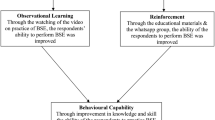Abstract
Background. Training on breast health is required to increase awareness of early detection of breast cancer, especially in countries with limited resources.Methods. Of the 784 invited women, 462 participated in the study (58.9%). The training included both theoretical and breast self-examination (BSE) training between preeducation and posteducation tests. Following the theoretical presentation, breast examination training was performed using a breast simulator. The competency of the participants on breast examination was assessed by an evaluation guide.Results. All breast cancer symptoms were stated at significantly higher rates compared to those before education (P<.05). The most commonly stated risk factor in both preeducation and posteducation tests was “no breast-feeding,” with ratios of 15.2% and 56.3%, respectively. Early detection modalities for breast cancer were also stated more often in the posteducation test compared to the preeducation (P<.05). In the preeducation test, only 4.3% to 18.7% of the participants women could state most of the BSE steps. After BSE training, 85% to 92% of the participants were competent in BSE steps.Conclusions. Theoretical education on breast cancer and BSE training in low-educated women, even illiterate, is highly effective.
Similar content being viewed by others
References
Henderson BE, Pike MC, Bernstein L, et al. Breast Cancer. In: Schottenfeld D, Fraumeni JF, JR, eds. Cancer Epidemiology and Prevention. Oxford, England: Oxford University Press, 1996:1022–1040.
Trichopoulos D, Lipworth L, Petridou E, et al. Epidemiology of Cancer. In: DeVita VT, Hellman S, Rosenberg SA eds. Cancer Principles and Practice of Oncology. Philadelphia, PA: Lippincott-Raven, 1997:231–259.
Breast Cancer Control Program, Breast Self Examination Training, Ministry of Health of Turkish Republic. Available at: http://www.saglik.gov.tr/extras/birimler/ksdb/meme_kontrol_strateji.pdf. Accessed June 27, 2006.
Firat D, Çelik I, eds. Cancer Statistics in Turkey: Turkish Association For Cancer Research and Control; 1998.
Health Statistics 2001, Ministry of Health of Turkish Republic, Ankara, Turkey. Available at: http://www.saglik.gov.tr/extras/istatistikler/apk2001/091.htm. Accessed June 27, 2006.
Death Statistics at City and Town Centers 2001. Ankara: Republic of Turkey, Prime Minister’s Office, State Statistics Institute, Ankara, Turkey; 2001.
Koroltchouk V, Stanley K, Stjernsward J. The control of breast cancer. a World Health Organization perspective. Cancer. 1990;65:2803–2810.
Smith RA, Saslow D, Sawyer KA, et al. American Cancer Society guidelines for breast cancer screening: update 2003. CA Cancer J Clin. 2003;53:141–169.
Sullivan R, Gaffikin L, Lowry E, eds. Program Development Guide for Medical Educators. Ankara, Turkey: JHPIEGO, Hacettepe Community Medicine Trust; 1999.
Cancer Early Diagnosis and Screening Centers (KETTM) Situation Report (1995–2004), Ministry of Health Turkish Republic, Ankara, Turkey. Available at: http://www.saglik.gov.tr/sb/default.asp?sayfa=birimler&cid=15&sid=1192. Accessed July 19, 2005.
Wood RY, Duffy ME, Morris SJ, et al. The effect of an educational intervention on promoting breast self-examination in older African American and Caucasian women. Oncol Nurs Forum. 2002;29:1081–1090.
Champion V. The Role of Breast Self Examination in Breast Cancer Screening. Cancer. 1992;69:1985–1991.
Fletcher SW, O’Malley MS, Earp JL, et al. How best to teach women breast self examination. Ann Intern Med. 1990;112:772–779.
Thomas DB, Gao DL, Ray RM, et al. Randomized trial of breast self-examination in Shangai final results. J Natl Cancer Inst. 2002;94:1445–1457.
Humprey LL, Helfand M, Chan BKS, et al. Breast cancer screening: a summary of the evidence for the US Preventive Services Task Force. Ann Intern Med. 2002;137:347–360.
Anderson BO, Braun S, Lim S, et al. Early detection of breast cancer in countries with limited resources. Breast J. 2003;9(Suppl 2):S51-S59.
Author information
Authors and Affiliations
Corresponding author
Additional information
Supported by Gazi University, Project Code 31/2002-01.
Rights and permissions
About this article
Cite this article
Budakoglu, I.I., Maral, I., Ozdemir, A. et al. The effectiveness of training for breast cancer and breast self-examination in women aged 40 and over. J Canc Educ 22, 108–111 (2007). https://doi.org/10.1007/BF03174358
Issue Date:
DOI: https://doi.org/10.1007/BF03174358



